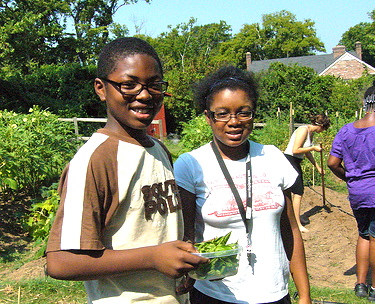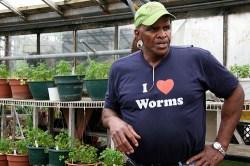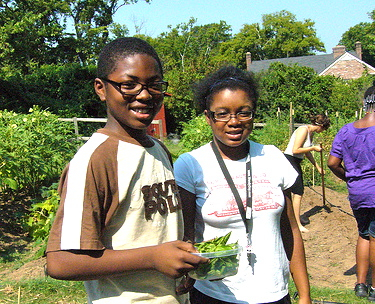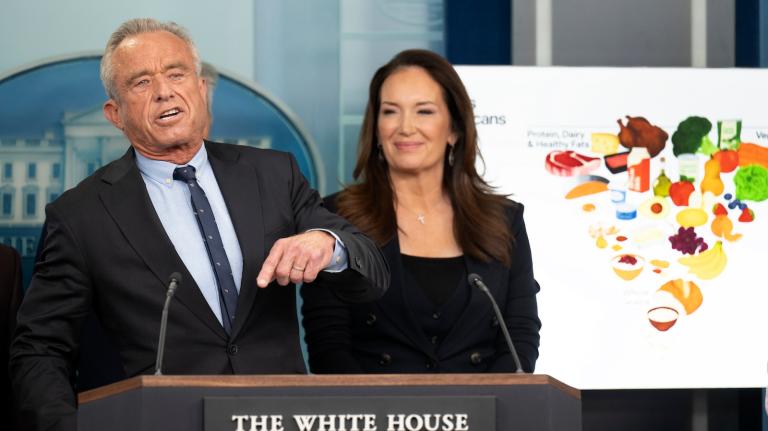
Young urban farmers. (Photo by kt_ries.)
Food-justice organization Growing Power — with its now-iconic greenhouses, composting worms, fishponds, and multiple generations of graduates — is well-known as a model worth replicating. Now, Growing Power has announced a bountiful $5 million grant from the W.K. Kellogg Foundation to fund “community food centers” aimed at relieving hunger in five of the nation’s poorest areas.
Modeled on Growing Power’s Milwaukee farm-headquarters, the centers will be located in Detroit; New Orleans; Forest City, Ark.; Shelby, Miss.; and Taos, N.M.
“It’s all wrapped around providing healthy, sustainable, local food to folks, especially our youth,” explains Will Allen, founder and director of Growing Power. “Many of the young people in those communities go to bed hungry every night.”
The grant was actually awarded in January 2011, but wasn’t formally announced till Growing Power’s annual conference last week. Hence the project is already well under way. In fact, 40 people from the Detroit site attended the conference to learn the ins and outs of methods like closed-loop aquaponics and large-scale composting.
Like Growing Power, the partner organizations that will host the centers have long-standing records of connecting food issues with racial and social justice. With support and training, they will scale up their own trainings, production, and food distribution.
“Our partnership with Growing Power has helped us to start our large-scale composting operation and with the construction and maintenance of hoop houses,” says Malik Yakini, chair of the Detroit Black Community Food Security Network. “It’s a tremendous way for us to develop those opportunities, and to share them with others in Detroit.”
In New Mexico, the Taos County Economic Development Corporation will host the community food center. In Forest City and Shelby — both in the Mississippi Delta — Seven Harvest and Mississippians Engaged in Greener Agriculture will take the lead.
“The project will build the capacity of these organizations,” says Linda Jo Doctor, national food program officer for the W.K. Kellogg Foundation.
When describing the grant, people often used that word: “capacity.”
“The grant gives us more capacity,” echoed Nat Turner, director of Our School at Blair Grocery, home to the community food center in New Orleans’s Lower Ninth Ward. For his organization, more “capacity” means more staff. “We’ll bring on six or seven ex-offenders from the neighborhood and give them training around urban agriculture.”
Turner also plans to hire three youth from Our School’s summer program. “We’re talking about an underclass here,” Turner says. “There aren’t any other jobs for people in the neighborhood, especially without a high school diploma.” These new employees will help the organization expand its farms and programs.
By the time the money runs out in 2015, each community food center is expected to be running a robust training program without any outside help. In turn, the trainings will hopefully lead more people to go into farming. Doctor says, “We will probably see an increased number of urban farms in those locations.”
“The potential for workforce pipeline is phenomenal,” she adds. “Food access, improved health, and job opportunities are all interconnected, and they’re all part of this project.”

Growing Power’s founder, Will Allen. (Photo by Sarah Kanouse.)
It’s worth noting that the W.K. Kellogg Foundation was started by the same William Keith Kellogg who founded the breakfast-food juggernaut with the same name. According to its annual report, a substantial portion of the foundation’s funding comes from stock in the Kellogg Company. In other words, via the foundation, Froot Loops and Pop-Tarts profits are training people to eat things other than Froot Loops and Pop-Tarts.
Yet the grant is not as ironic as it might at first seem. The Kellogg Foundation has a long history of supporting urban agriculture and progressive food policy. It has, for instance, made grants to the Food Project in Massachusetts and People’s Grocery in the Bay Area. Last year, it gave $3.5 million to FoodCorps.
“The W.K. Kellogg Foundation really stands out among other foundations,” says Yakini of the Detroit Black Community Food Security Network. “[It] is an anti-racist organization. I have never heard any other foundation take that stance publicly.”
Growing Power’s urban projects are frequently the subject of news reports, but the rural ones are rarely described.
In the case of the Mississippi Delta, for instance, Allen says, “Most of the land has gone over to industrial agriculture. It’s devastated those towns, because most of the people used to have their own farms.” Now, he says the area is plagued by drugs, much in the way many urban areas are. And that’s all the more reason why Growing Power’s model can make a difference.
Allen and his staff will return to Mississippi and Arkansas to do trainings in October.




